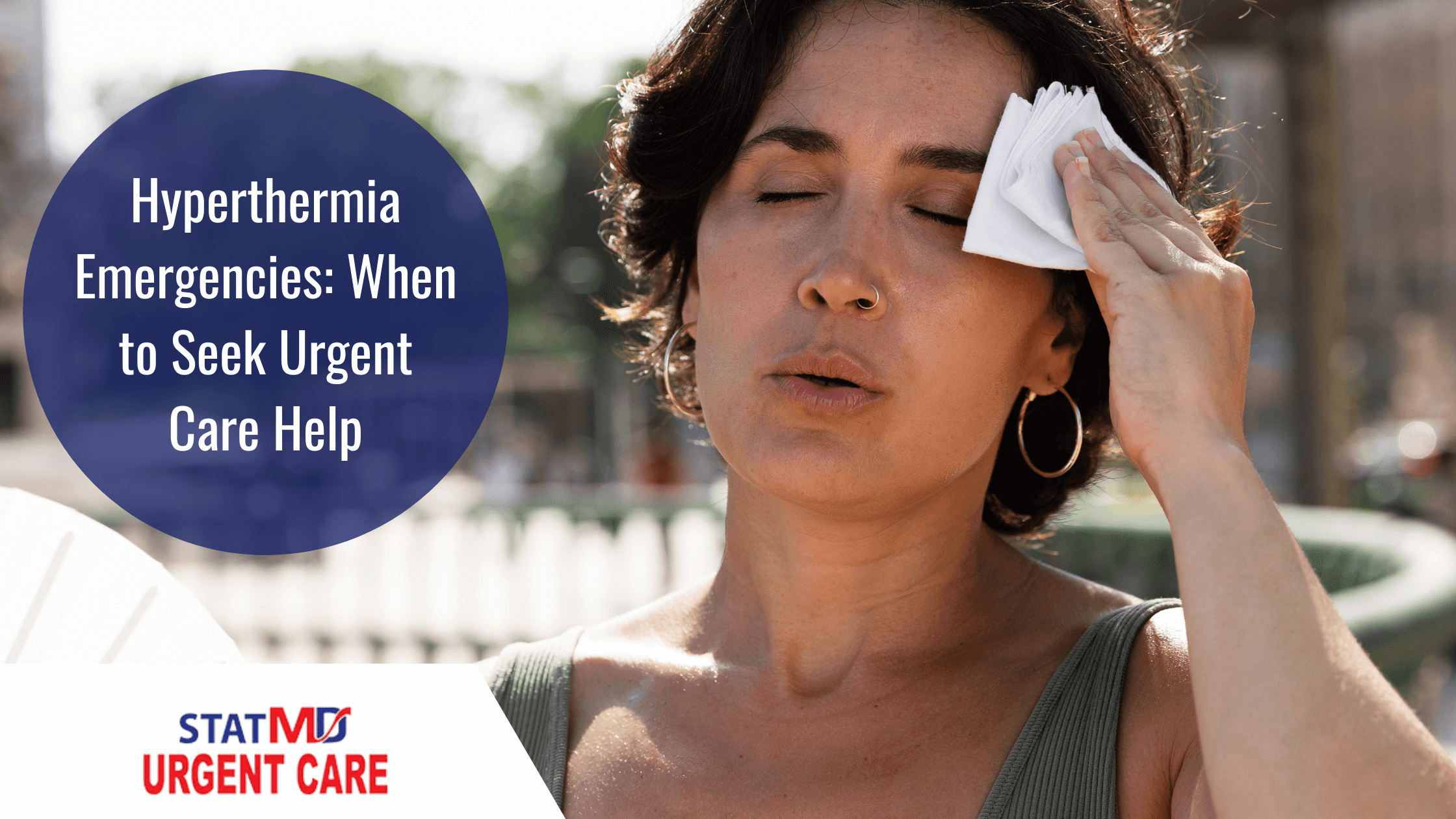
Flu Shots Now Available Don't Miss Out on Limited Supply!
For Young St: (661) 464-5000
For Panama Lane: (661) 464-5001

Hyperthermia refers to a medical condition where the body's core temperature rises above the normal range, often resulting from prolonged exposure to heat, strenuous physical activity, or other medical conditions. It can lead to various symptoms and potentially serious health complications, requiring prompt medical attention. Let’s learn about the causes and treatment of hyperthermia.
Hyperthermia is a medical condition characterized by an abnormal increase in body temperature, often due to the body's inability to regulate its temperature properly. The normal body temperature for humans typically ranges between 97.7°F (36.5°C) and 99.5°F (37.5°C). When the body's core temperature rises above this range, it is considered hyperthermia.
There are several types of hyperthermia, including heat cramps, heat exhaustion, and heat stroke. Heat cramps are muscle spasms or cramps that occur due to dehydration and electrolyte imbalances, typically during strenuous physical activity in hot environments.
Heat exhaustion is a severe form of hyperthermia characterized by heavy sweating, weakness, nausea, dizziness, and sometimes fainting. Heat stroke is a medical emergency and the most severe form of hyperthermia, which can result in organ damage or death.
Understanding hyperthermia is as crucial as it is a life-threatening condition characterized by an elevated body temperature that can have serious health consequences. It is essential to recognize the causes, symptoms, and management of hyperthermia to prevent heat-related illnesses and deaths.
Hyperthermia can occur in various settings, such as during heat waves, strenuous physical activity, and certain medical conditions. Timely understanding and intervention can help prevent complications and ensure proper treatment for those at risk of or experiencing hyperthermia.
There are different types of hyperthermia, which can be classified based on their causes and presentation. The main types of hyperthermia are:
Heat cramps: Heat cramps are muscle cramps or spasms due to dehydration and electrolyte imbalances during prolonged physical activity in hot weather.
Heat exhaustion: It is a more severe form of hyperthermia due to prolonged exposure to high temperatures and dehydration, characterized by heavy sweating, weakness, dizziness, nausea, headache, and elevated body temperature.
Heat stroke: It is a life-threatening form of hyperthermia. It occurs when the body's temperature regulation system fails and body temperature rises to a dangerous level. It causes symptoms such as high body temperature (above 104°F or 39.4°C), rapid heartbeat, vomiting, seizures, and loss of consciousness.
Infectious hyperthermia: Certain infections, such as bacterial or viral infections, can cause hyperthermia as part of the body's immune response. Examples include fever caused by influenza, pneumonia, urinary tract infections, and sepsis.
Common signs and symptoms that trigger hyperthermia may include:
Fatigue and weakness: Heat-related fatigue and weakness can be early signs of hyperthermia. As the body works to cool down, it may divert energy from other functions, leading to feelings of fatigue and weakness.
Headache and dizziness: Hyperthermia can cause headaches and dizziness due to increased blood flow to the skin and reduced blood flow to the brain.
Nausea and vomiting: Heat-related nausea and vomiting can occur as your body tries to cope with the excess heat and maintain normal body functions.
Rapid heart rate and breathing: As the body works to regulate temperature, the heart rate and breathing rate may increase in an attempt to cool down through increased blood flow and respiratory effort.
The treatment aims to lower the body's core temperature as quickly as possible to prevent further damage to organs and tissues. The hyperthermia treatment typically includes the following steps:
Move to a cooler environment: The person should move to a cooler, shaded area away from direct sunlight. If possible, an air-conditioned room or a shaded area with fans or cool breezes should be sought. This helps to reduce the body's exposure to heat and aids in cooling.
Remove excess clothing: Any unnecessary clothing should be removed to allow for better heat dissipation from the skin surface.
Hydrate: The person should drink cool water or sports drinks that contain electrolytes to help replenish fluids lost due to sweating and to restore the body's electrolyte balance.
Monitor vital signs: It is essential to monitor the person's vital signs, like heart rate, blood pressure, and breathing rate. If the person becomes unconscious, initiate CPR (cardiopulmonary resuscitation) and call emergency services immediately.
Here are some vital tips to prevent hyperthermia:
Stay hydrated: Drink fluids, especially water, throughout the day. Avoid alcoholic beverages and drinks high in caffeine, as they may increase the chances of dehydration.
Dress appropriately: Wear lightweight, light-colored, loose-fitting clothing made of breathable fabrics such as cotton, which allows air to circulate your body and helps to keep you cool.
Seek shade: Stay in shaded areas, especially during the hottest parts of the day. If you are outdoors, use umbrellas and hats to shield yourself from the sun.
Take cool showers or baths: Cooling your body with water can help lower your body temperature. Take cool showers, or baths, or use cool compresses on your skin to help cool down.
Hyperthermia is a condition that requires prompt medical attention and appropriate management. Whether it's caused by environmental factors, such as hot weather or prolonged exposure to heat sources, or underlying health conditions, hyperthermia can be serious and even life-threatening. Mitigating the risks associated with hyperthermia is crucial, and this can be achieved by recognizing the signs and symptoms, taking preventive measures, and seeking medical help when needed.
Looking for hyperthermia treatment near you? Our experienced team at StatMD Urgent Care has the expertise and experience to treat all types of hyperthermia and other heat-related illnesses. Contact us today and ensure you can beat the heat this season. Don't delay. Prioritize your health with StatMD Urgent Care!